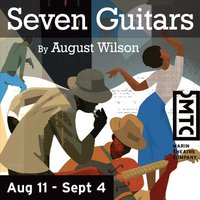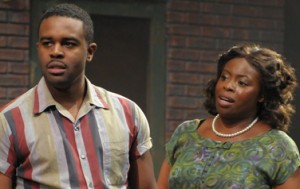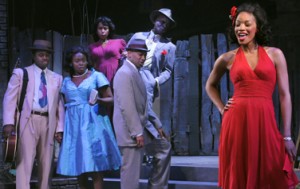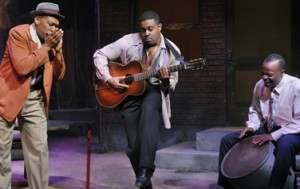
SEVEN GUITARS HITS A POWERFUL CHORD
Late playwright August Wilson’s reputed knack for capturing time, place, and character crystallizes unforgettably in the Marin Theatre Company’s production of Seven Guitars, which is bolstered by understated yet effective direction by award-winning Broadway veteran Kent Gash. It succeeds as riveting, quality theatre while remaining uncompromisingly true-to-life.
In a backyard in 1940s Hill District of Pittsburgh, would-be bluesman Floyd “Schoolboy” Barton (Tobie Windham) has just been released from the workhouse to discover that a song he recorded a year earlier is now a hit. Aflame to capitalize on his success in Chicago, his passion inadvertently catalyzes the folks who share this gritty, post war neighborhood, aptly described as “hell with the lid off.” The result is a parade of simmering human passions, raw emotion, and sly to raucous humor. The melding of a powerful, lyrical script with a uniformly unflinching cast creates waves of unassailable experiences that are by turns ominous, mystical, menacing, funny, shocking, and violent. Like a concerto for seven guitars (the symbol for these seven African-American lives), this estimable company presents a production which harmonizes, jangles, hits discord, and resolves in a well-deserved standing ovation.
 The play is the third in playwright Wilson’s “Century Cycle” decalogue, which captures the black experience in America decade by decade in the 20th Century. Between poetic lines delivered with true-to-life cadence and colloquialism, Callie Floor’s detailed costuming, and bewitching blues music (courtesy of savvy music director and Bay Area music icon Linda Tillery), the entire evening swirls with immediacy. Much of the excitement stems from the validation that theater can bring history to life while being cathartic and entertaining at the same time.
The play is the third in playwright Wilson’s “Century Cycle” decalogue, which captures the black experience in America decade by decade in the 20th Century. Between poetic lines delivered with true-to-life cadence and colloquialism, Callie Floor’s detailed costuming, and bewitching blues music (courtesy of savvy music director and Bay Area music icon Linda Tillery), the entire evening swirls with immediacy. Much of the excitement stems from the validation that theater can bring history to life while being cathartic and entertaining at the same time.
The length of the first act (90 minutes) is unnoticed at best and forgivable at worst, as the viewer is caught up in the rhythm of the story, which is as unfailing as a blues beat and steady as the river encircling the Hill District. Its bedrock may lie in Wilson’s mother (whose name he took); he has written, “The content of my mother’s life – her myths, her superstitions, her prayers, the contents of her pantry, the smell of her kitchen, the song that escaped from her sometimes parched lips, her thoughtful repose and pregnant laughter – are all worthy of art.” This informs the pulse of this play.
 With astute listening skills and organic choices, the actors masterfully seize moments of calm even as they simmer with unreleased pressure; still, when they burst, it mirrors a volcano that must release its fiery contents in order to survive. Even though we sense the imminent explosion, it still feels unexpected, and the sobering surprise we are left with is uncanny. In a play that is driven by character more than plot, this style of acting is compulsory. Their non-linear communication may challenge viewers to follow it, yet it is mandatory, as it reinforces the context necessary to bring the scrappy, resolute Hill District to thrilling life.
With astute listening skills and organic choices, the actors masterfully seize moments of calm even as they simmer with unreleased pressure; still, when they burst, it mirrors a volcano that must release its fiery contents in order to survive. Even though we sense the imminent explosion, it still feels unexpected, and the sobering surprise we are left with is uncanny. In a play that is driven by character more than plot, this style of acting is compulsory. Their non-linear communication may challenge viewers to follow it, yet it is mandatory, as it reinforces the context necessary to bring the scrappy, resolute Hill District to thrilling life.
One can relate to Floyd’s unyielding passion, which is generated from his desire to make good with the past, and Windham beautifully personifies the obsessive idealism that presages an inevitable downfall. Charles Branklyn is masterful as Hedley, an odd figure in the Hill District, as he dreams of plantations and fathering the Messiah – a storyline which resolves with a quirky twist by the beautiful and otherworldly Ruby (Shinelle Azoroh). The cast’s other two women, Margo Hall as the sassy Louise and Omoze Idehenre as the emotionally wounded yet stalwart Vera, present highly satisfying well-rounded tributes to the survival of spirit in hell. (Windham and Idehenre were both outstanding in last year’s Marcus at A.C.T.)
 Scenic designer J.B. Wilson’s cauldron-like set, with a hill reaching into the sky and down to the backyard, is surrounded by walls and windows. Not only is it beautiful, but it sets up an insular, claustrophobic feeling. The set, along with Gash’s focused direction, keeps the viewer’s eye directed and pinned to the action. Kurt Landisman’s lighting effects are particularly powerful, especially when the lights tighten on performers, seemingly exposing their internal motivations. Moments are effectively freeze-framed in light, such as when the Lord’s Prayer is sung by a doomed Floyd, during which the audience collectively held its breath. Small, understated moments, such as the ominous knell-like crowing of a rooster or the use of a washtub bass in a backyard band, ethereally transport us as if they were magically stolen from a moment in time (composition and sound by Chris Houston).
Scenic designer J.B. Wilson’s cauldron-like set, with a hill reaching into the sky and down to the backyard, is surrounded by walls and windows. Not only is it beautiful, but it sets up an insular, claustrophobic feeling. The set, along with Gash’s focused direction, keeps the viewer’s eye directed and pinned to the action. Kurt Landisman’s lighting effects are particularly powerful, especially when the lights tighten on performers, seemingly exposing their internal motivations. Moments are effectively freeze-framed in light, such as when the Lord’s Prayer is sung by a doomed Floyd, during which the audience collectively held its breath. Small, understated moments, such as the ominous knell-like crowing of a rooster or the use of a washtub bass in a backyard band, ethereally transport us as if they were magically stolen from a moment in time (composition and sound by Chris Houston).
Visually stunning and psychically rich, this quirkily enchanting production succeeds in bringing Wilson’s vision of the black American experience to life.
strevenon @ stageandcinema.com
photos by Ed Smith
Seven Guitars
scheduled to end September 4
for tickets, visit http://www.marintheatre.org
